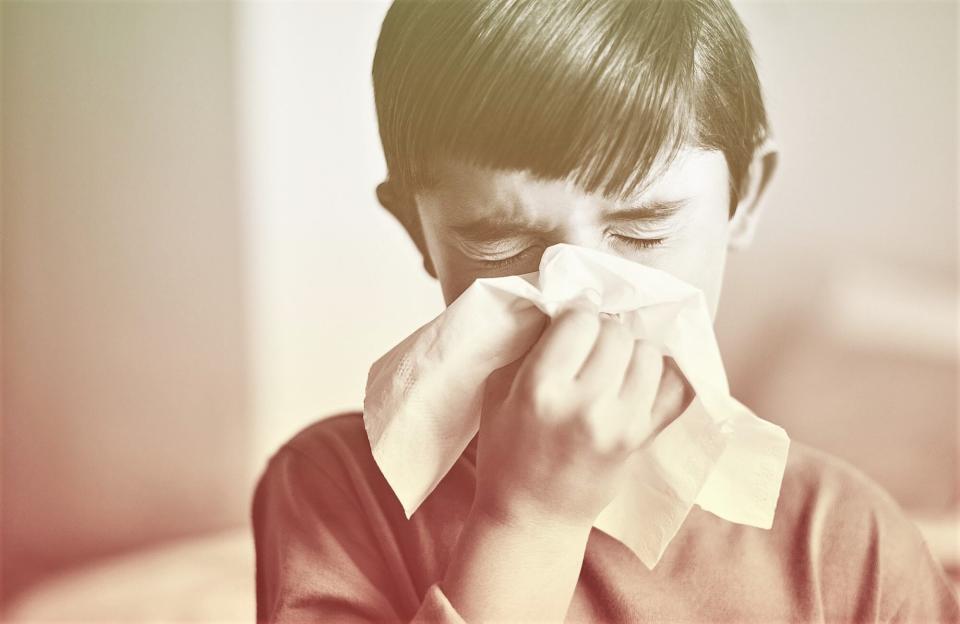When Does Flu Season Start and End?

Getty Images
As warm weather approaches, the last thing people want to think about is viruses. But when it comes to the influenza, there's good news: flu season is coming to an end!
Flu season is a term that describes the months when influenza cases are the highest; like any virus, the number of infected people tends to ebb and flow in a relatively predictable pattern each year. Keep reading to learn when flu season starts and ends, and how to keep yourself and your family healthy this year.
When Does Flu Season Start?
Flu season typically begins in October, says Jay Woody, M.D., FACEP, ABEM, chief medical officer of Intuitive Health and a co-founder of Legacy ER & Urgent Care. "But cases tend to increase as the months get colder, and peak in January and February in the Northern Hemisphere." If you live in the Southern Hemisphere, you can expect to start seeing cases of the flu increase around April.
When Does Flu Season End?
Of course, you can get the flu any time of the year, since the virus is never fully eradicated; it simply lies dormant in warmer months. "While it is possible to get the flu out of season, it is not very common and would most likely be due to exposure from someone coming from an active flu area into an off-season area and spreading it," says Dr. Woody.
In general, though, flu season typically ends in April or May, with very few cases found outside of the months of October through April. Flu season ends around September or October in the Southern Hemisphere.
When Should Kids Get the Flu Vaccine?
At the start of flu season, it's impossible to determine how many cases will be diagnosed, and which influenza strains will circulate the most. "The flu virus changes yearly and vaccines are carefully formulated every year to provide protection against the most common current strains. In short, this means the vaccine you got last year isn't necessarily going to be effective this time around. This is why it's important to get a flu shot every year," say Dr. Woody.
The Centers for Disease Control and Prevention (CDC) recommends people get a flu shot as soon as the vaccine becomes available—ideally by the end of October. "The flu vaccine takes up to three weeks to reach maximum efficiency," says Dr. Woody, which means the earlier you get the current vaccine, the better.
That said, the CDC notes "even if you are not able to get vaccinated until November or later, vaccination is still recommended because flu most commonly peaks in February and significant activity can continue into May."
RELATED: The Most Common Side Effects of the Flu Shot in Kids Are Mild—Here's What Parents Need to Know
If your child needs two doses of the flu vaccine, they should get the first shot when it becomes available. The second dose is given at least 4 weeks afterwards, says the CDC.
How to Protect Your Family from the Flu
Once the flu starts circulating, you can reduce your family's chance of getting sick. Besides getting vaccinated, here are some of the most important steps you can take, according to Dr. Woody:
Stay home when you're sick. This can prevent spreading the virus even more, and it also promotes your own return to health.
Wash your hands regularly. "This is a small yet significant step in living healthier," says Dr. Woody. "Regularly washing your hands helps prevent bad bacteria and viruses from entering your body and causing you to get sick. Frequent hand-washing can help you avoid the flu and other diseases," including the coronavirus.
Wear a mask in crowded indoor places. Any face mask that completely covers the mouth and the nose is effective because it prevents the aerosolization of contagious flu droplets, says Dr. Woody. In other words, face coverings can keep the virus particles from entering your nose and mouth, which can lead to infection.
Eat a balanced diet. Your diet affects your overall health, so to keep your body in top condition, try to eat balanced meals that include plenty of fruits and vegetables, especially during flu season.

